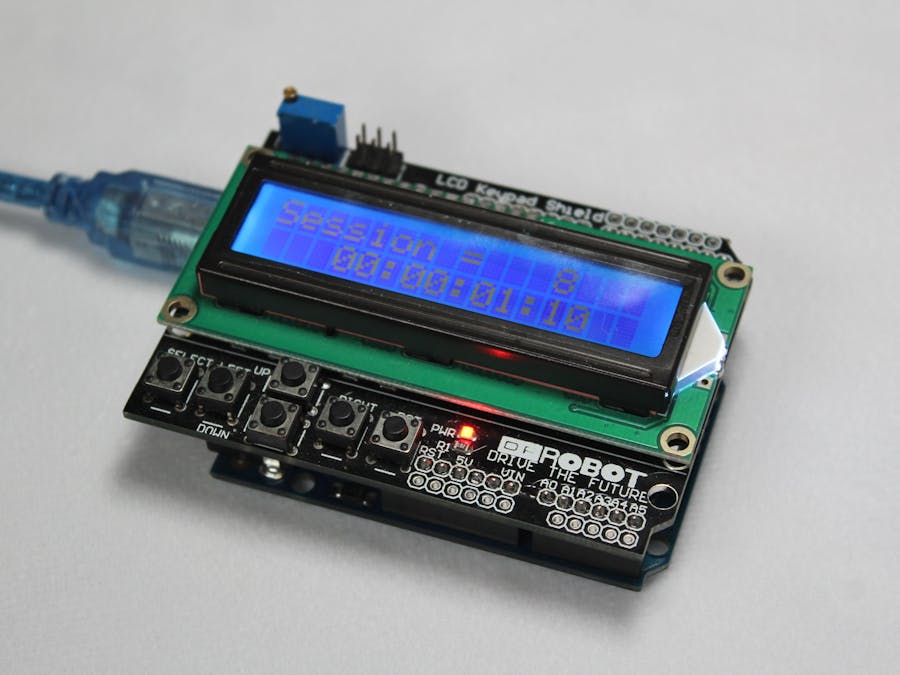Maintains a record of every instance when a USB port undergoes power cycling and retains the corresponding data for a maximum duration of 24 hours.
Things used in this project
Hardware components
Hand tools and fabrication machines
3D Printer (generic)
Story

Power Time Logger 1.0.0 for Arduino UNO and LCD Keypad Shield.
Copyright (c) 2022, Alex Aldridge
Published on October 7, 2022
Power Time Logger records each time a USB port is powered on/off.
Total recording time is 24 hours.
Press the SELECT button to switch between total on/off and total time.
Press the LEFT button to reset the program.
Use this project to log usage times for any device that has an on/off USB port (wifi router, 3D printer, computer, etc.).
This software is free and open-source; anyone can redistribute it and/or modify it.
Code
Power Time Logger
C/C++
Power Time Logger 1.0.0 for Arduino UNO and LCD Keypad Shield.
/*
Power Time Logger 1.0.0 for Arduino UNO and LCD Keypad Shield.
Copyright (c) 2022, Alex Aldridge
Published on October 7, 2022
www.alexaldridge.co
Power Time Logger records each time a USB port is powered on/off.
Total recording time is 24 hours.
Press the SELECT button to switch between total on/off and total time.
Press the LEFT button to reset the program.
Use this project to log usage times for any device that has an on/off USB port (wifi router, 3D printer, computer, etc.).
This software is free and open-source; anyone can redistribute it and/or modify it.
*/
#include <LiquidCrystal.h>
#include <EEPROM.h>
const int pin_RS = 8;
const int pin_EN = 9;
const int pin_d4 = 4;
const int pin_d5 = 5;
const int pin_d6 = 6;
const int pin_d7 = 7;
const int pin_BL = 10;
LiquidCrystal lcd( pin_RS, pin_EN, pin_d4, pin_d5, pin_d6, pin_d7);
extern volatile unsigned long timer0_millis;
int count_turn_on=0;
unsigned long storage;
unsigned long seconds ;
unsigned long minutes ;
unsigned long hours ;
unsigned long runtime;
unsigned long runtime_total;
unsigned long future;
unsigned long total_acc_time;
void setup() {
lcd.begin(16, 2);
count_turn_on=EEPROM.read(0);
count_turn_on=count_turn_on+1;
EEPROM.write(0, count_turn_on);
future=(EEPROM_readlong(0x55))+(EEPROM_readlong(0x02));
EEPROM_writelong(0x55, future);
EEPROM_writelong(0x02,0);
}
void loop() {
runtime=millis();
runtime_total=runtime;
lcd.setCursor(0, 0);
lcd.print("Session: ");
lcd.setCursor(10, 0);
lcd.print(EEPROM.read(0));
seconds = runtime / 1000;
minutes = seconds / 60;
hours = minutes / 60;
runtime %= 1000;
seconds %= 60;
minutes %= 60;
hours %= 24;
lcd.setCursor(0,1);
lcd.print("Time: ");
if(hours<10)
{
lcd.setCursor(7, 1);
lcd.print("0");
lcd.setCursor(8,1);
lcd.print(hours);
}
else if(hours>=10)
{
lcd.setCursor(7,1);
lcd.print(hours);
}
lcd.setCursor(9, 1);
lcd.print(":");
if(minutes<10)
{lcd.setCursor(10, 1);
lcd.print("0");
lcd.setCursor(11,1);
lcd.print(minutes);
}else if (minutes>=10)
{lcd.setCursor(10,1);
lcd.print(minutes);
}
lcd.setCursor(12, 1);
lcd.print(":");
if (seconds<10)
{
lcd.setCursor(13, 1);
lcd.print("0");
lcd.setCursor(14, 1);
lcd.print(seconds);
}
else if (seconds>=10)
{
lcd.setCursor(13, 1);
lcd.print(seconds);
}
if (runtime>=86400)
{
noInterrupts ();
timer0_millis = 0;
interrupts ();
}
EEPROM_writelong(0x02,runtime_total);
if(analogRead(A0)>=601 && analogRead(A0)<=700)
{
lcd.clear();
total_acc_time=future+runtime_total;
seconds = total_acc_time / 1000;
minutes = seconds / 60;
hours = minutes / 60;
total_acc_time %= 1000;
seconds %= 60;
minutes %= 60;
hours %= 24;
lcd.setCursor(3,0);
lcd.print("Total time");
lcd.setCursor(0,1);
lcd.print("");
if(hours<10)
{
lcd.setCursor(4, 1);
lcd.print("0");
lcd.setCursor(5,1);
lcd.print(hours);
}
else if(hours>=10)
{
lcd.setCursor(5,1);
lcd.print(hours);
}
lcd.setCursor(6, 1);
lcd.print(":");
if(minutes<10)
{lcd.setCursor(7, 1);
lcd.print("0");
lcd.setCursor(8,1);
lcd.print(minutes);
}else if (minutes>=10)
{lcd.setCursor(7,1);
lcd.print(minutes);
}
lcd.setCursor(9, 1);
lcd.print(":");
if (seconds<10)
{
lcd.setCursor(10, 1);
lcd.print("0");
lcd.setCursor(11, 1);
lcd.print(seconds);
}
else if (seconds>=10)
{
lcd.setCursor(10, 1);
lcd.print(seconds);
}
delay(1000);
lcd.clear();
}
//
else if (analogRead(A0)>=401 && analogRead(A0)<=500)
{
lcd.clear();
EEPROM_writelong(0x02,0);
EEPROM_writelong(0x55,0);
total_acc_time=0;
future=0;
EEPROM.write(0, 0);
noInterrupts ();
timer0_millis = 0;
interrupts ();
lcd.setCursor(0,0);
lcd.print("Reset");
delay(1000);
lcd.clear();
}
}
unsigned long EEPROM_readlong(int address)
{
unsigned long dword = EEPROM_readint(address);
dword = dword << 16;
dword = dword | EEPROM_readint(address+2);
return dword;
}
void EEPROM_writeint(int address, int value)
{
EEPROM.write(address,highByte(value));
EEPROM.write(address+1 ,lowByte(value));
}
void EEPROM_writelong(int address, unsigned long value)
{
EEPROM_writeint(address+2, word(value));
value = value >> 16;
EEPROM_writeint(address, word(value));
}
unsigned int EEPROM_readint(int address)
{
unsigned int word = word(EEPROM.read(address), EEPROM.read(address+1));
return word;
}Power Time Logger 1.0.0
https://github.com/AlexAldridge/Arduino/blob/Power-Time-Logger/Power-Time-Logger-1.0.0
The article was first published in hackster, October 7, 2022
cr: https://www.hackster.io/alexaldridge/power-time-logger-for-arduino-uno-fe7fab
author: alexaldridge











